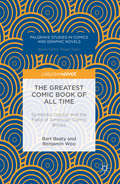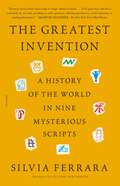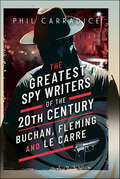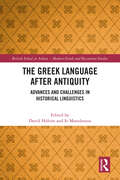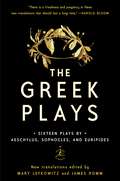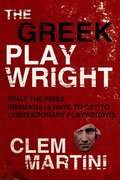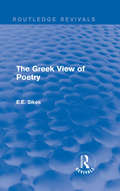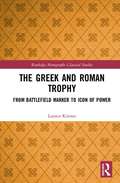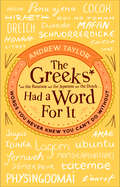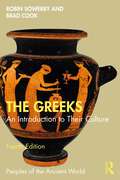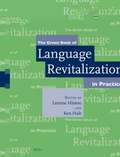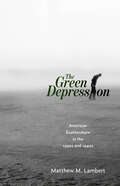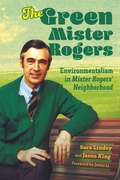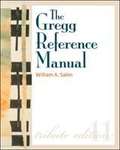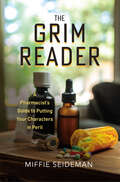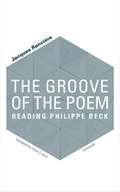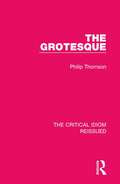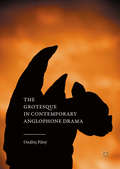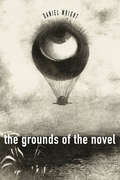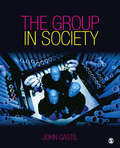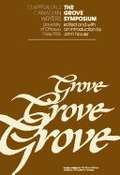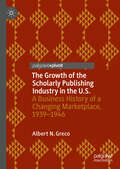- Table View
- List View
The Greatest Comic Book of All Time
by Bart Beaty Benjamin WooBart Beaty and Benjamin Woo work to historicize why it is that certain works or creators have come to define the notion of a "quality comic book," while other works and creators have been left at the fringes of critical analysis.
The Greatest Invention: A History of the World in Nine Mysterious Scripts
by Silvia FerraraIn this exhilarating celebration of human ingenuity and perseverance—published all around the world—a trailblazing Italian scholar sifts through our cultural and social behavior in search of the origins of our greatest invention: writing.The L where a tabletop meets the legs, the T between double doors, the D of an armchair’s oval backrest—all around us is an alphabet in things. But how did these shapes make it onto the page, never mind form complex structures such as this sentence? In The Greatest Invention, Silvia Ferrara takes a profound look at how—and how many times—human beings have managed to produce the miracle of written language, traveling back and forth in time and all across the globe to Mesopotamia, Crete, China, Egypt, Central America, Easter Island, and beyond.With Ferrara as our guide, we examine the enigmas of undeciphered scripts, including famous cases like the Phaistos Disk and the Voynich Manuscript; we touch the knotted, colored strings of the Inca quipu; we study the turtle shells and ox scapulae that bear the earliest Chinese inscriptions; we watch in awe as Sequoyah single-handedly invents a script for the Cherokee language; and we venture to the cutting edge of decipherment, in which high-powered laser scanners bring tears to an engineer’s eye.A code-cracking tour around the globe, The Greatest Invention chronicles a previously uncharted journey, one filled with past flashes of brilliance, present-day scientific research, and a faint, fleeting glimpse of writing’s future.
The Greatest Spy Writers of the 20th Century: Buchan, Fleming and Le Carre
by Phil CarradiceThe spy novel has, over the past hundred years, become one of the most popular literary genres. The best exponents have become household names, as have their characters, heroes and villains alike. From Richard Hannay to James Bond and George Smiley, the spies and spy-hunters of fiction have developed from the printed page to grace the movie and television screens - with huge success. Uncovering the greatest or best spy writers of the Twentieth Century has not been easy. There are so many to choose from. Ultimately, however, the choice has come down to three highly significant and successful exponents of the art, writers who cannot be ignored but, more significantly, who were leaders, movers and shakers in the art of writing spy fiction. John Buchan was at the forefront, arguably the first in a long line of spy writers - and still one of the finest. Classic tales like The Thirty-Nine Steps and Greenmantle set the benchmark for everyone else to follow. Ian Fleming's creation of James Bond in books like Goldfinger and From Russia with Love took the spy novel to new heights of glamor and exotic settings. John le Carre's world of spies, double-dealing, betrayal and seedy backstreet assignations is the very antithesis of Fleming's Bond but its realism and stark reality took the art of spy fiction to a new level. Buchan, Fleming, Le Carre, arguably the greatest spy writers of the Twentieth Century. Do you agree? Read the book and make your own judgement. Whatever you decide, you will not be disappointed by the writing and the judgements.
The Greek Epic Cycle and Its Ancient Reception
by Fantuzzi, Marco and Tsagalis, Christos Marco Fantuzzi Christos TsagalisThe poems of the Epic Cycle are assumed to be the reworking of myths and narratives which had their roots in an oral tradition predating that of many of the myths and narratives which took their present form in the Iliad and the Odyssey. The remains of these texts allow us to investigate diachronic aspects of epic diction as well as the extent of variation within it on the part of individual authors - two of the most important questions in modern research on archaic epic. They also help to illuminate the early history of Greek mythology. Access to the poems, however, has been thwarted by their current fragmentary state. This volume provides the scholarly community and graduate students with a thorough critical foundation for reading and interpreting them.
The Greek Language after Antiquity: Advances and Challenges in Historical Linguistics (British School at Athens - Modern Greek and Byzantine Studies)
by David Holton Io ManolessouThe Greek Language after Antiquity offers an in-depth look at the diachrony of the Greek language, focusing on a period relatively neglected by modern scholarship: the more than 1,000 years between the end of Antiquity and the early modern period. These studies, written by experts in the field, target different levels of analysis (phonology, morphology, semantics, lexicon, dialectology, sociolinguistics), combining substantial primary data with various theoretical approaches.It begins with a radical proposal for a different approach to the historical linguistics of Greek, focused on the process of language diversification, as opposed to the traditional genetic approach to dialect emergence. Other topics include register variation in Byzantine literature, crucial for understanding the subsequent evolution of a written standard; morphological variation in conjunction with problems of textual transmission in medieval and early modern vernacular texts, with special focus on the notion of “philology”; evidence for language contact in the Late Medieval period; and the use of graphemic evidence, i.e. spelling, to detect changes in pronunciation over a long time span. Two chapters examine issues of word formation: one presents a new research project on diachronic derivational morphology; the other examines compound formation in the Cretan dialect. The final chapter examines theoretical and methodological issues in studying the historical semantics of Greek.This book is essential reading for researchers in Greek historical linguistics and especially useful for students, teachers and researchers in Classics, Byzantine studies and general linguistics, with important connections to the historical linguistics and text-critical studies of other languages, particularly Romance and Turkish.
The Greek Plays: Sixteen Plays by Aeschylus, Sophocles, and Euripides
by Sophocles Aeschylus Euripides James Romm Mary LefkowitzThe great plays of Ancient Greece are among the most enduring and important legacies of the Western world. Not only is the influence of Greek drama palpable in everything from Shakespeare to modern television, the insights contained in Greek tragedy have shaped our perceptions of the nature of human life. Poets, philosophers, and politicians have long borrowed and adapted the ideas and language of Greek drama to help them make sense of their own times. <p><p> This exciting curated anthology features a cross section of the most popular—and most widely taught—plays in the Greek canon. Fresh translations into contemporary English breathe new life into the texts while capturing, as faithfully as possible, their original meaning. <p> This outstanding collection also offers short biographies of the playwrights, enlightening and clarifying introductions to the plays, and helpful annotations at the bottom of each page. Appendices by prominent classicists on such topics as “Greek Drama and Politics,” “The Theater of Dionysus,” and “Plato and Aristotle on Tragedy” give the reader a rich contextual background. A detailed time line of the dramas, as well as a list of adaptations of Greek drama to literature, stage, and film from the time of Seneca to the present, helps chart the history of Greek tragedy and illustrate its influence on our culture from the Roman Empire to the present day. <p> With a veritable who’s who of today’s most renowned and distinguished classical translators, The Greek Plays is certain to be the definitive text for years to come.
The Greek Playwright: What the First Dramatists Have To Say To Contemporary Playwrights
by Clem MartiniPicking up where The Blunt Playwright left off, Clem Martini returns to the subject of playwriting, turning his attention to the lessons modern playwrights can learn from the ancient Greeks. Outlining the major playwrights of the era, their major works, and the impact they had on our modern understanding of drama, Martini weaves his direct, informative, and entertaining style through centuries of dramatic evolution to show us exactly what the first dramatists have to say to contemporary playwrights.
The Greek View of Poetry (Routledge Revivals)
by E.E. SikesThe Greek View of Poetry details critical theories and the appreciation of poetry by the ancient Greeks. Originally published in 1931, this text deals with a whole range of Greek critics from very early criticism to Longinus and his views on Homer in an attempt to provide a historical view of the importance of poetry to Greek society. This title will be of interest to students of Classics.
The Greek and Roman Trophy: From Battlefield Marker to Icon of Power (Routledge Monographs in Classical Studies)
by Lauren KinneeIn The Greek and Roman Trophy: From Battlefield Marker to Icon of Power, Kinnee presents the first monographic treatment of ancient trophies in sixty years. The study spans Archaic Greece through the Augustan Principate. Kinnee aims to create a holistic view of this complex monument-type by breaking down boundaries between the study of art history, philology, the history of warfare, and the anthropology of religion and magic. Ultimately, the kaleidoscopic picture that emerges is of an ad hoc anthropomorphic Greek talisman that gradually developed into a sophisticated, Augustan sculptural or architectural statement of power. The former, a product of the hoplite phalanx, disappeared from battlefields as the Macedonian cavalry grew in importance, shifting instead onto coins and into rhetoric, where it became a statement of military might. For their part, the Romans seem to have encountered the trophy as an icon on Syracusan coinage. Recognizing its value as a statement of territorial ownership, the Romans spent two centuries honing the trophy-concept into an empire-building tool, planted at key locations around the Mediterranean to assert Roman presence and dominance. This volume covers a ubiquitous but poorly understood phenomenon and will therefore be instructive to upper-level undergraduates, graduate students, and scholars in all fields of Classical Studies.
The Greeks Had a Word For It: Words You Never Knew You Can't Do Without
by Andrew TaylorDo you ever search in vain for exactly the right word? Perhaps you want to articulate the vague desire to be far away. Or you can’t quite convey that odd urge to go outside and check to see if anyone is coming. Maybe you’re struggling to express there being just the right amount of something – not too much, but not too little. While the English may not have a word for it, the good news is that the Greeks, the Norwegians, the Dutch or possibly the Inuits probably do. Whether it’s the Norwegian forelsket (that feeling of euphoria at the start of a love affair) or the Indonesian jayus (a joke so poorly told and so unfunny that you can’t help but laugh), this delightful smörgåsbord of wonderful words from around the world will come to the rescue when the English language fails. Part glossary, part amusing musings, but wholly enlightening and entertaining, The Greeks Had a Word For It means you’ll never again be lost for just the right word.
The Greeks: An Introduction to Their Culture (Peoples of the Ancient World)
by Robin Sowerby Brad CookThis fully revised, new edition of The Greeks is a concise but wide-ranging introduction to the culture of ancient Greece, providing a comprehensive survey that covers all the key elements of ancient Greek civilisation from the age of Homer to the Hellenistic period.It opens with an overview of ancient historical sources and their authors and perspectives before delving into early history, legends and excavations, and the famed age of classical Greece. Chapters follow on politics, religion, daily life, literature, philosophy, and art and architecture, with a concluding chapter on the Greek world following the death of Alexander the Great and during the Roman era. This new edition features: greater discussion of underrepresented groups, especially women and slaves; a chapter on ancient politics that provides a comparison of an ancient aristocracy, democracy, and monarchy in Sparta, Athens, and Macedon; new and revised images, all now with detailed captions to merge the artefacts and texts more fully and bring the narrative to life for every reader; and new translations of all ancient passages revised for accuracy and clarity. Clearly written, with generous references to original source material, The Greeks places ancient Greek culture firmly in its political, social, and historical context.The fourth edition of The Greeks remains an invaluable introduction for all students of Classics and an indispensable guide for students of other disciplines who require grounding in ancient Greek civilisation and history.
The Green Book of Language Revitalization in Practice
by Leanne Hinton Kenneth HaleWith world-wide environmental destruction and globalization of economy, a few languages, especially English, are spreading rapidly in use, while thousands of other languages are disappearing, taking with them important cultural, philosophical and environmental knowledge systems and oral literatures. We all stand to suffer from such a loss, none more so than the communities whose very identity is being threatened by the impending death of their languages. In response to this crisis, indigenous communities around the world have begun to develop a myriad of projects to keep their languages alive. This volume is a set of detailed accounts about the kind of work that is going on now as people struggle for their linguistic survival. It also serves as a manual of effective practices in language revitalization. Following are the key features: 23 case studies of language revitalization in practice, from Native American languages, Australian languages, Maori, Hawaiian, Welsh, Irish, and others, written primarily by authors directly involved in the programs; short introductions situate the languages, to help make the languages more 'real' in the minds of readers; each chapter gives a detailed overview of the various kinds of programs and methods in practice today; introductions and maps for each of the languages represented familiarize the reader with their history, linguistic structure and sociolinguistic features; and, strong representation in authorship and viewpoint of the people and communities whose languages are threatened, gives the readers an inside understanding of the issues involved and the community-internal attitudes toward language loss and revitalization. This book was previously published by Academic Press under ISBN 978-01-23-49354-5.
The Green Depression: American Ecoliterature in the 1930s and 1940s
by Matthew M. LambertDust storms. Flooding. The fear of nuclear fallout. While literary critics associate authors of the 1930s and ’40s with leftist political and economic thought, they often ignore concern in the period’s literary and cultural works with major environmental crises. To fill this gap in scholarship, author Matthew M. Lambert argues that depression-era authors contributed to the development of modern environmentalist thought in a variety of ways. Writers of the time provided a better understanding of the devastating effects that humans can have on the environment. They also depicted the ecological and cultural value of nonhuman nature, including animal “predators” and “pests.” Finally, they laid the groundwork for “environmental justice” by focusing on the social effects of environmental exploitation. To show the reach of environmentalist thought during the period, the first three chapters of The Green Depression: American Ecoliterature in the 1930s and 1940s focus on different geographical landscapes, including the wild, rural, and urban. The fourth and final chapter shifts to debates over the social and environmental effects of technology during the period. In identifying modern environmental ideas and concerns in American literary and cultural works of the 1930s and ’40s, The Green Depression highlights the importance of depression-era literature in understanding the development of environmentalist thought over the twentieth century. This book also builds upon a growing body of scholarship in ecocriticism that describes the unique contributions African American and other nonwhite authors have made to the environmental justice movement and to our understanding of the natural world.
The Green Mister Rogers: Environmentalism in Mister Rogers' Neighborhood (Children's Literature Association Series)
by Jason King Sara LindeyFred Rogers was an international celebrity. He was a pioneer in children’s television, an advocate for families, and a multimedia artist and performer. He wrote the television scripts and music, performed puppetry, sang, hosted, and directed Mister Rogers’ Neighborhood for more than thirty years. In his almost nine hundred episodes, Rogers pursued dramatic topics: divorce, death, war, sibling rivalry, disabilities, racism. Rogers’ direct, slow, gentle, and empathic approach is supported by his superior emotional strength, his intellectual and creative courage, and his joyful spiritual confidence. The Green Mister Rogers: Environmentalism in “Mister Rogers’ Neighborhood” centers on the show’s environmentalism, primarily expressed through his themed week “Caring for the Environment,” produced in 1990 in coordination with the twentieth anniversary of Earth Day. Unfolding against a trash catastrophe in the Neighborhood of Make-Believe, Rogers advances an environmentalism for children that secures children in their family homes while extending their perspective to faraway places, from the local recycling center to Florida’s coral reef. Rogers depicts animal wisdom and uses puppets to voice anxiety and hope and shows an interconnected world where each part of creation is valued, and love is circulated in networks of care. Ultimately, Rogers cultivates a practical wisdom that provides a way for children to confront the environmental crisis through action and hope and, in doing so, develop into adults who possess greater care for the environment and a capacious imagination for solving the ecological problems we face.
The Gregg Reference Manual: A Manual of Style, Grammar, Usage, and Formatting
by William SabinThe Gregg Reference Manual is intended for anyone who writes, edits, or prepares material for distribution or publication. For over fifty years this manual has been recognized as the best style manual for business professionals and for students who want to master the on-the-job standards of business professionals.
The Grim Reader: A Pharmacist's Guide to Putting Your Characters in Peril
by Miffie SeidemanMany authors draw from headlines or movies rather than personal experience to write drug-related scenes, and the result may be more fiction than fact. So, how can you craft a convincing scene involving accidental use of fentanyl-tainted pot or a murder attempt with grandma's pain pills?A much-needed resource, The Grim Reader details how to write medical scenarios that result in realistic page-turners. As drug inaccuracies multiply in screenplays, scripts, novels, and audio plays, Dr. Miffie Seideman, Pharm.D. provides writers (and editors) with the background and authenticity necessary to develop plausible plotlines, including: • Pertinent drug facts, tips, and symptoms • Symptom timelines • Tips for developing historically accurate scenes • Common street drug names and slang • Sample scenarios to demonstrate how to weave the information into a believable scene • Writing prompts to provide scene starters and offer practice Combining Seideman's pharmacology knowledge with her love for creative writing, The Grim Reader is the ultimate guide to help authors craft accurate drug scenes and avoid medical mistakes.
The Grimace of Macho Ratón: Artisans, Identity, and Nation in Late-Twentieth-Century Western Nicaragua
by Les FieldIn this creative ethnography Les W. Field challenges a post-Sandinista national conception of identity, one that threatens to constrict the future of subaltern Nicaraguans. Drawing on the works and words of artisans and artisanas, Indians, and mestizos, Field critiques the national ideology of ethnic homogeneity and analyzes the new forms of social movement that have distinguished late-twentieth-century Nicaragua. As a framework for these analytic discussions, Field uses the colonial-era play El Güegüence o Macho Ratón and the literature relating to it. Elite appropriations of El Güegüence construe it as an allegory of mestizo national identity in which mestizaje is defined as the production of a national majority of ethnically bounded non-Indians in active collaboration with the state. By contrast, Field interprets the play as a parable of cultural history and not a declaration of cultural identity, a scatological reflection on power and the state, and an evocation of collective loss and humor broadly associated with the national experience of disempowered social groups. By engaging with those most intimately involved in the performance of the play--and by including essays by some of these artisans--Field shows how El Güegüence tells a story about the passing of time, the absurdity of authority, and the contradictions of coping with inheritances of the past. Refusing essentialist notions of what it means to be Indian or artisan, Field explains the reemergence of politicized indigenous identity in western Nicaragua and relates this to the longer history of artisan political organization. Parting ways with many scholars who associate the notion of mestizaje with identity loss and hegemony, Field emphasizes its creative,productive, and insightful meanings. With an emphasis on the particular struggles of women artisans, he explores the reasons why forms of collective identity have posed various kinds of predicaments for this marginalized class of western Nicaraguans. This book will appeal to readers beyond the field of Latin American anthropology, including students and scholars of literature, intellectual history, women's studies, and the politics of ethnicity.
The Groove of the Poem: Reading Philippe Beck (Univocal)
by Jacques Rancière&“Music is the brute that shows. It is the avowal of materials, And stutters between its clanging of things.&”How should one think this musical groove of the poem whose back and forth motion shuffles the material of ordinary language and revives the frozen speech of old chants? This question by renowned French thinker Jacques Rancière is the entry point for his earnest and careful reading of one of France&’s most singular and important contemporary poets. For Rancière, Philippe Beck sets himself the task of a poetry after poetry whereby Beck re-writes and transforms the poems of the past, reanimating faded genres, poetizing the prose of popular tales and even commentaries regarding poems. To read and follow this groove traced as such cannot simply be done by way of taking the poems as objects of study. It supposes a dialogue regarding what these poems attempt to do as well as an idea of a poetry which serves as their foundation. This book on Philippe Beck is thus also a book made with him.
The Grotesque (The Critical Idiom Reissued #23)
by Philip ThomsonFirst published in 1972, this book provides a helpful overview of the grotesque and its use in a number of literary genres including novels, drama and poetry. After providing a historical summary of the term, the book discusses the various defining aspects of the grotesque and its relationship to other terms and modes of literature, such as satire, the comic and parody. The final chapter presents the functions and purpose of the grotesque in literature. This book will be a useful resource for those studying literary theory and literary works which include an element of the grotesque.
The Grotesque in Contemporary Anglophone Drama
by Ondřej PilnýGrotesque features have been among the chief characteristics of drama in English since the 1990s. This new book examines the varieties of the grotesque in the work of some of the most original playwrights of the last three decades (including Enda Walsh, Philip Ridley, Tim Crouch and Suzan-Lori Parks), focusing in particular on ethical and political issues that arise from the use of the grotesque.
The Grounds of the Novel
by Daniel WrightWhat grounds the fictional world of a novel? Or is such a world peculiarly groundless? In a powerful engagement with the latest debates in novel theory, Daniel Wright investigates how novelists reckon with the ontological status of their works. Philosophers who debate whether fictional worlds exist take the novel as an ontological problem to be solved; instead, Wright reveals the novel as a genre of immanent ontological critique. Wright argues that the novel imagines its own metaphysical "grounds" through figuration, understanding fictional being as self-sufficient, cohesive, and alive, rather than as beholden to the actual world as an existential anchor. Through philosophically attuned close readings of novels and reflections on writerly craft by Thomas Hardy, Olive Schreiner, Colson Whitehead, Virginia Woolf, Zadie Smith, Henry James, and Akwaeke Emezi, Wright shares an impassioned vision of reading as stepping into ontologically terraformed worlds, and of literary criticism as treading and re-treading the novel's grounds.
The Group in Society
by John W. GastilThe Group in Society meets the challenges of teaching courses on small groups by revealing the full complexity of small groups and their place in society. It shows students the value of learning how to carefully study a group's history and context, rather than merely learning a fixed set of group participation skills. This text brings together disparate theories and research (from communication, social psychology, organizational and managerial studies, and sociology) in a way that helps students make sense of a complex body of scholarship on groups.
The Grove Symposium
by John NauseThe Grove symposium deserves to be and, indeed, will long be remembered as setting the standard by which future discussions of the works of Canadian authors are judged.
The Growth of the Scholarly Publishing Industry in the U.S.: A Business History of a Changing Marketplace, 1939–1946
by Albert N. GrecoThis book analyzes the dynamic growth of the scholarly publishing industry in the United States during 1939-1946, a critical period in the business history of scholarly publications in STM and the humanities and the social sciences. It explains how the key publishing players positioned themselves to take advantage of the war economy and how they used different business and marketing strategies to create the market and demand for scholarly publications. Not only did the atomic threat necessitate a surge in scholarly research, but at the same time scholarly publishing managers prepared for the dramatic shift by anticipating the potential impact of the GI Bill on higher education, creating superb printed products, and by becoming the brand, the source of knowledge and information. The creation of strategic business units and value chains as well as the development of marketing targeting strategies resulted in brand loyalty to certain publishers and publications but also accelerated the growth of the US scholarly publishing industry. Business historians and marketing professors interested in the business strategies of scholarly publishers during World War II will find this book to be a valuable resource.
